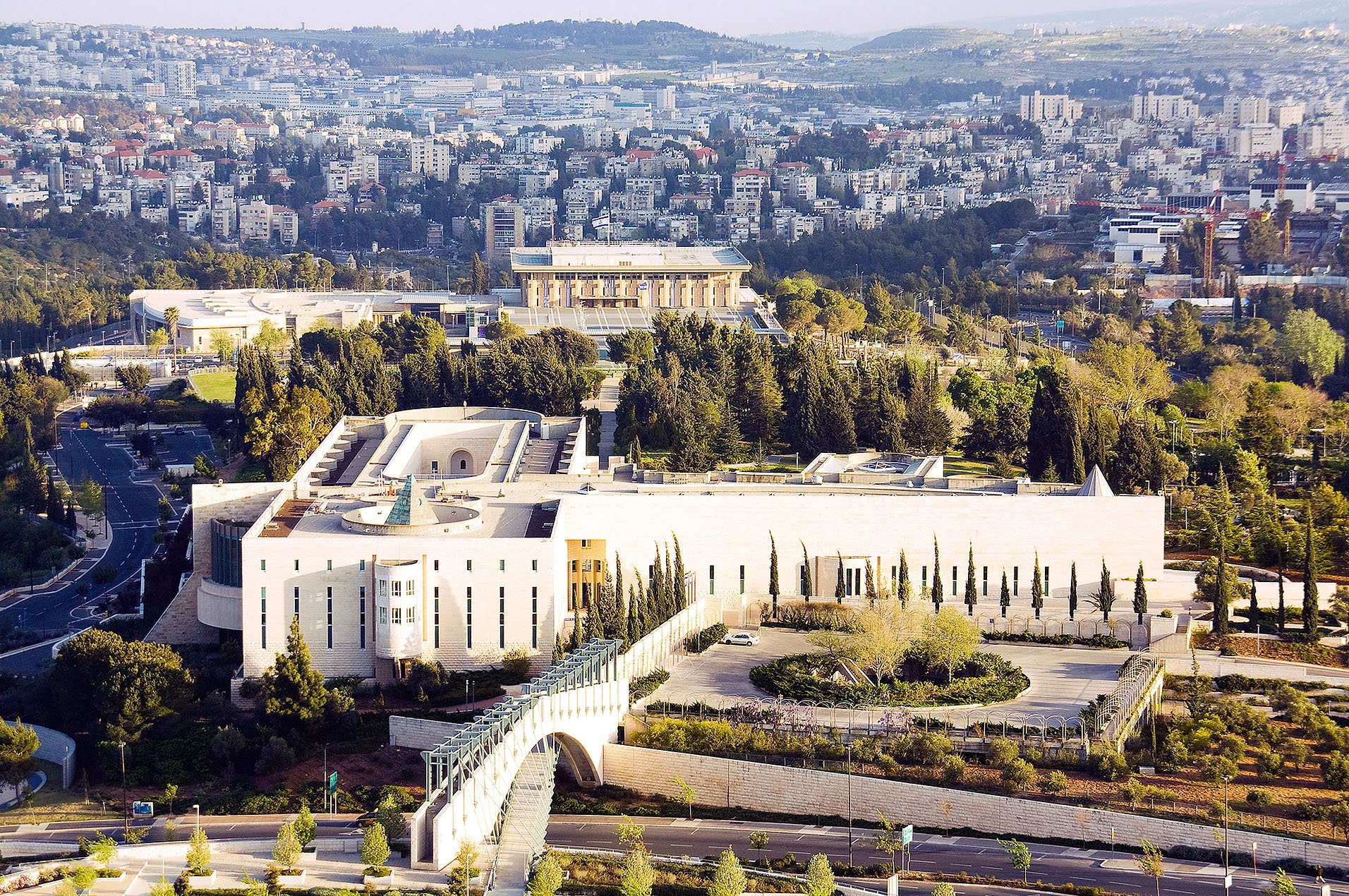
Israel’s government, which took power in January, 2023 (click here for further background), has proposed major changes to the balance of power between the Supreme Court and the Knesset (Israel’s Parliament). This triggered widespread protests and a deeply divisive debate in Israel and abroad.[1] As a non-partisan education organization, StandWithUs cannot advocate for or against any proposed law in Israel. However, we do educate about politics and different sides of controversial issues. The resource below covers historical background and context, along with a variety of external perspectives.
Historical Background
The debate over the role of Israel’s Supreme Court is connected to important developments that occurred in the 1990s. Israel has no constitution but it does have Basic Laws, which have more weight than regular laws. In the 1990s, Israel’s Supreme Court began interpreting the country’s Basic Laws as a type of constitution, and using them to challenge legislation passed by the Knesset and other actions taken by the government. This came to be known as the “Constitutional Revolution.”[2]
How would the government’s proposals change Israel’s justice system?[3]
The government is advancing a set of laws that would:
- Make itsignificantly harder for the Supreme Court to overturn laws made by elected leaders.
- Give a majority of 61 (out of 120) Members of the Knesset the power to overturn Supreme Court decisions.
- Give elected officials from the governing coalition the power to appoint most judges, replacing the current system where both the governing coalition and Supreme Court Justices can block candidates from being appointed.
- Decrease the power of the Attorney General and other legal advisors to government ministries.
- Remove “reasonableness” or “extreme unreasonableness” as grounds for the Supreme Court to reverse or prevent government actions.
For further details, see the sources in Footnote #3
Who are the supporters and opponents of these changes, and what are their main arguments?
- Israel’s new governing coalition, which is made up of right wing and religious political parties, is attempting to pass the changes outlined above into law. The government and its supporters say[4]:
- These changes are needed to restore balance to Israeli democracy and ensure the government reflects the will of Israeli voters, who elected a right wing and religious government.
- The Supreme Court and other parts of the legal system are unelected and abuse their power to achieve the political goals of the left.
- The changes will ensure that elected officials can govern effectively and make Israel more similar to other democracies, where political leaders appoint judges.
- Opponents include current and former Israeli Supreme Court Justices, Prime Ministers, security officials, a past President, prominent tech CEOs, leading economists, and heads of opposition political parties. Most come from the left, center, and center-right of the Israeli political spectrum. Critics of the proposed judicial changes say[5]:
- The Supreme Court overturns laws and other government decisions when they violate the law and/or the rights of individuals and groups. This is essential for democracy, which requires not only majority rule but also strong protections for minority groups.
- Israel’s current system of government is different from other democracies, which have multiple houses of parliament and/or a more independent legislature with much greater power to check the executive branch. In Israel, the Supreme Court is the only institution that can reliably prevent the government and Knesset from abusing their power and creating a “tyranny of the majority.”
- The changes harm Israel’s economy, deepen social and political divisions, undermine the IDF, and damage Israel’s standing around the world.
- Prime Minister Benjamin Netanyahu has sought to calm fears about the economy and pledged to uphold democracy and protect the rights of all Israelis, including the LGBTQ+ community, Arab citizens, secular people, and women.[6] However, other members of his governing coalition have proposed policies that would enable discrimination, according to critics. This has contributed to fears that weakening the Supreme Court will lead to widespread abuses of power by the government.
- This debate has become so intense partly because it has gone beyond how Israel’s government should function. For some Israelis it is also about deeper divisions, such as:
- Whether Israel should be more religious or more secular (including tensions over the fact that many ultra-Orthodox Jewish Israelis do not serve in the military).
- Whether it is most important for Israel to be a Jewish state or a democratic state.
- If Israel’s governing institutions should be more representative of Mizrahi Jews (who tend to vote for more religious and right wing parties) or secular Ashkenazi Jews (who tend to vote for centrist and left wing parties)?
- The relationship between Jewish and Arab citizens of Israel.
- How to deal with the Israeli-Palestinian conflict.
Protests and other acts of opposition to the government’s proposed laws
- Protests and “Days of Disruption” have been taking place in Israeli cities for months, with hundreds of thousands of people participating across the country.[7] Smaller protests have occurred in cities like London and New York as well.[8]
- Some IDF reservists, including those serving in elite military units, have threatened to not show up for reserve duty if the changes are passed in their current form.[9]
- Some prominent Israeli tech companies and foreign investors have reportedly moved billions of dollars out of Israel, citing concerns that Israel will no longer have a strong and independent judiciary to ensure a stable environment for doing business.[10]
Calls for calm and compromise
There have been increasingly heated statements on different sides of this debate, including support for violence in some cases. Numerous Israeli leaders have even expressed concerns about the potential for a civil war to break out. This has led to calls for calm and dialogue from many parts of Israeli society. According to polls, the vast majority of Israelis want the government and the opposition to create a compromise.[11]
- Israel’s President Isaac Herzog has been among the most prominent figures calling for compromise. He presented a detailed proposal on March 15th, 2023, saying it was created after consulting with leading supporters and opponents of the current government.[12]
- Others have proposed compromise plans of their own, including the Kohelet Policy Forum, a conservative thinktank that was reportedly involved in drafting the laws that the government is currently attempting to pass.[13]
- Politicians from the government and opposition parties have expressed support for negotiations, and potentially for compromise. However, there have been no direct talks because the opposition has called for the legislative process to stop while negotiations take place, but the government has rejected that condition and said it will pass its proposed laws by the end of March.
- The government has rejected the specific plan proposed by President Herzog, while some opposition leaders have expressed support or said they would be willing to use it as a starting point for talks.[14]
- On March 20th, 2023, the government announced that all but one of its proposed laws will be delayed until the next Knesset session, which begins in May. The one they plan to pass in March is an updated version of the judicial appointments bill. This bill would give any new government in Israel full control over the first two judges appointed to the Supreme Court during its term. The third appointment would need the support of at least one opposition Member of Knesset and the fourth would also require the support of a Supreme Court Justice. The previous version would have given the government full control over all appointments.[15]
- Israel’s opposition parties strongly criticized this move. They argue that the changes to the judicial appointments law don’t go far enough and that all the proposed laws have to be put on hold for negotiations to take place. They have also called for more protests.
- Large protests are likely to continue, and there is a potential that Israel’s powerful Histadrut labor federation will declare a strike if no compromise is reached.[16]
The outcome of this debate remains unclear, and we will share educational resources about any major new developments. We reaffirm our support of Israel, respect for Israeli democracy and vibrant debate, and pride in Israel’s Jewish and democratic values.
Watch for updates here.
Max Samarov is Executive Director of Research & Strategy at StandWithUs. This was written in conjunction with other researchers at SWU.
[1] I24NEWS, “Over 300,000 rally across Israel in 10th week of judicial reform protests,” i24 News, March 11, 2023, at https://www.i24news.tv/en/news/israel/society/1678558975-tens-of-thousands-rally-across-israel-in-10th-week-of-judicial-overhaul-protests
[2] Haviv Rettig Gur, “Battle over High Court exposes frailty of Israel’s piecemeal system of government,” Times of Israel, January 11, 2023, at https://www.timesofisrael.com/battle-over-high-court-exposes-israel-weak-piecemeal-system-of-government/
Prof. Amichai Cohen, Prof Yuval Shani, “The New Israeli Government’s ‘Constitutional Law Reforms’: Why now? What do they mean? And what will happen next?” The Israel Democracy Institute, February 14, 2023, at
https://en.idi.org.il/articles/47913;
[3] Israel Democracy Institute, “The Planned Overhaul of Israel’s Judiciary,” at https://en.idi.org.il/tags-en/47383; Adv. Aharon Garber and Adv. Avraham Shalev, “Why judicial reform is essential,” Kohelet Policy Forum, February 19, 2023, at https://en.kohelet.org.il/publication/why-judicial-reform-is-essential
[4] Adv. Aharon Garber and Adv. Avraham Shalev, “Why judicial reform is essential,” Kohelet Policy Forum, February 19, 2023, at https://en.kohelet.org.il/publication/why-judicial-reform-is-essential
[5] Israel Democracy Institute, “The Planned Overhaul of Israel’s Judiciary,” at https://en.idi.org.il/tags-en/47383
[6] TOI Staff, “PM defends judicial overhaul: Amendments will be made responsibly, everyone calm down,” Times of Israel, January 13, 2023, at https://www.timesofisrael.com/pm-defends-justice-reform-amendments-will-be-made-responsibly-everyone-calm-down/; Ilan Ben Zion, “Netanyahu rebukes far-right ally for anti-LGBTQ comments,” Associated Press, December 25, 2022, at https://apnews.com/article/israel-discrimination-benjamin-netanyahu-lgbtq-people-78bcd332053aa26c3c9949eac2264d1c
[7] TOI Staff, “Protesters block roads in day of ‘escalating resistance’ as PM nixes Herzog proposal,” Times of Israel, March 16th, 2023, at https://www.timesofisrael.com/protesters-plan-day-of-escalating-resistance-as-pm-nixes-herzogs-compromise-offer/
[8] Luke Tress and TOI Staff, “Hundreds demonstrate in New York, London against Israeli judicial shakeup plan,” Times of Israel, March 12, 2023, at https://www.timesofisrael.com/hundreds-demonstrate-in-new-york-london-against-israeli-judicial-shakeup-plan/
[9] TOI Staff, “IDF chief warns Netanyahu that reservist protest refusals could spread in military,” TOI Staff, March 5th, 2023, at https://www.timesofisrael.com/idf-chief-warns-netanyahu-that-reservist-protest-refusals-could-spread-in-military/
[10] Ash Obel, “Report: Bank officials believe $4 billion moved out of Israel in recent weeks,” Times of Israel, February 15th, 2023, at https://www.timesofisrael.com/report-bank-officials-believe-4-billion-moved-out-of-israel-in-recent-weeks/
[11] Sam Halpern, “Two-thirds of Israelis oppose Netanyahu government’s judicial reform – poll,” The Jerusalem Post, February 21, 2023, at https://www.jpost.com/israel-news/politics-and-diplomacy/article-732262
[12] TOI Staff, “Warning of civil war, Herzog unveils framework for judicial reform; PM rejects it,” Times of Israel, March 15, 2023, at https://www.timesofisrael.com/a-golden-path-after-weeks-long-effort-president-debuts-overhaul-compromise-offer/
[13] AFP, Ynet, “Israeli scholars present judicial reform compromise amid mass protests,” YNet News, March 14, 2023, at https://www.ynetnews.com/article/b1bi0ct1h; Jeremy Sharon, “Kohelet, right-wing think tank that inspired overhaul, calls for partial compromise,” Times of Israel, March 14, 2023, at https://www.timesofisrael.com/right-wing-think-tank-that-inspired-judicial-overhaul-calls-for-compromise/
[14] TOI Staff, “‘Unacceptable, insulting’: PM, coalition dismiss Herzog’s judicial reform framework,” Times of Israel, March 15, 2023, at https://www.timesofisrael.com/unacceptable-pm-coalition-swiftly-reject-herzogs-justice-reform-framework/
[15] Jeremy Sharon, Carrie Keller-Lynn, and TOI Staff, “Coalition to bring judicial appointments bill for final votes before Passover,” Times of Israel, March 20, 2023, at https://www.timesofisrael.com/coalition-heads-to-bring-judicial-appointments-bill-for-final-votes-before-passover/
[16] TOI Staff, “Protesters block roads in day of ‘escalating resistance’ as PM nixes Herzog proposal,” Times of Israel, March 16th, 2023, at https://www.timesofisrael.com/protesters-plan-day-of-escalating-resistance-as-pm-nixes-herzogs-compromise-offer/























 More news and opinions than at a Shabbat dinner, right in your inbox.
More news and opinions than at a Shabbat dinner, right in your inbox.